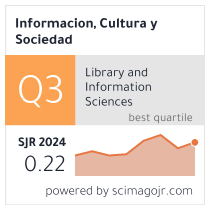Beyond the Reference Desk: From email to Web 2.0
Abstract
The current state of the technologies in the services of reference and the possibilities that they offer to improve them and to expand them are analyzed. The market of software for the digital reference is a market in constant evolution in which it is possible to find adequate products for any model of reference for any budget. From low price (or free) products to products of thousands of dollars. The chosen software should be in harmony with the library goals for a digital reference service and, with its capacity to negotiate the change. The different options of available software are examined, from the basic software to the advanced software specifically developed for the digital reference, as well as the solutions that Web 2.0 offers to expand the offering of the service. Besides, the most important factors that should be keep in mind to carry out the most adequate election in function of the objectives and the needs of each library are studied, bearing in mind that the choice of software cannot determine the objectives of the service of reference. This work intends to be useful guide to successfully implement services of digital reference.Downloads
Authors publishing in this journal acknowledge the conditions below:
- Authors retain the copyright of their work while they transfer the right of the first publishing to the journal, under the Creative Commons Attribution-ShareAlike 4.0 International (CC BY-SA 4.0) Licence, which allows third parties to reproduce them under the condition that express mention is given to the author and to its original publication in the journal.
- Authors may enter into other contractual and independent arrangements for the non-exclusive distribution of the version of the article published in this journal (for instance, it can be published in an institutional repository or in a book). In any case, an express mention should be given to its first publication in the journal.
- It is permitted and encouraged to publish online the articles (for example, on institutional or personal pages).


























